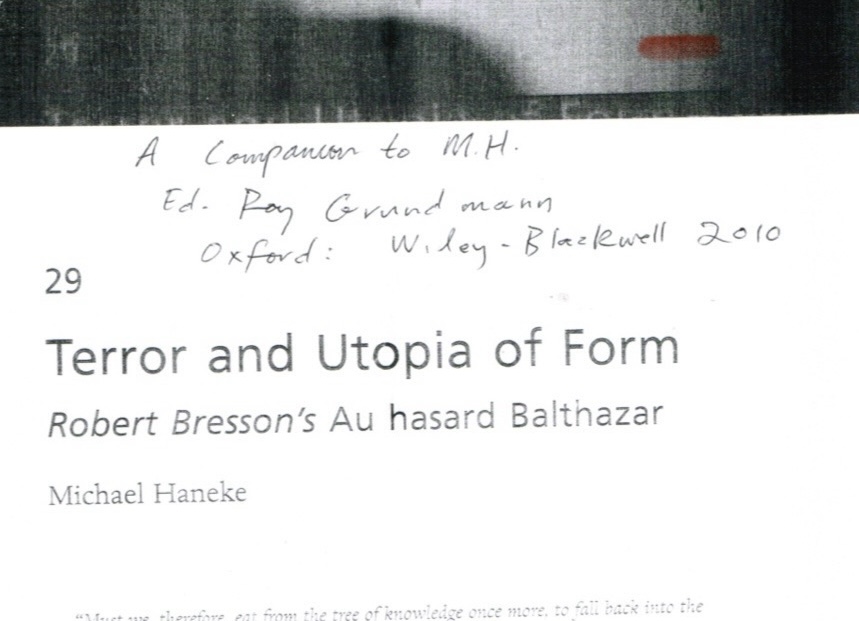Telepathic Judas ~ gn1

2002 Cannes
Precision rather than beauty - each shot shows only what is absolutely essential. each sequence nas seen compressed to its most concise form and briefest duration possible. Even so. the length of the shots and cuts are - even for the period when the fim was made 1965 - unusually caim. Never do pauses create room for sen-timentality, in its simplicity everything gives the impression of having developed naturally and. while being in the service of a rigorous aesthetic concept, is never the victim of the latter. Bresson reportedly intended to personify the seven deadly sins in his characters - out against a declaration such as this can be placed a sentence from his Notes sur le cinematograpite: "Hide the ideas, but in such a way that they can be found. The most important wilbe the best hidden." And a: another spot he writes. "production of emotion obtained by resistance to emotion." ind: "Emotion wil emerge from a mechanics. from the compulsion towards a mechanica: regularity" In support. he cites the pianism of Lipatti: "A grea: pianist. not a virtuoso one like Lipatti relentlessly hits the notes the same way: nar-notes, the same duration, the same intensity: fourth-notes. eighth-notes. sixteenth-notes. etc. lem. He doesn': pound the emotion into the keys. He waits for it. i: comes and takes over his fingers. the piano. him. the concert hall." What does this mean for the fim? One example: The village teacher, who has been dealt a rough blow both through his own pride is it the embodiment of nubris? and througn the malice of others. dies. still young. without having been ii from a broxen heart?. How is this being toid? The teacher's wife shows the pries: into the house. When opening the door to the reacher's room. she says: "He is full of despair perhaps you can heip him." The priest goes through the door into the room. The teacher in his bed turns toward the wall. The priest doesn't know what co say: Then he sees the teacher's tabie with the Bible, goes to get it and. siting down and opening it says: "One must have forgiveness. For everyone. You will be forgiren a lot because you suffer so much." The teacher, turned away: "I suie: less than you think" The priest leafs through the Bible. finds something. reads it to the teacher: "The Lord does not forsake forever and when ne sends as woes he is compassionate in his divine merey. He does no: like to humiliate mankind nor does he enjoy making them suffer." The teacher's wife had stopped at the partly open door. now she turns away: steps in front of the house, sits on the bench at the door, says: My Lord, p.ease do not take him away from me. too. Leave him for me. You know how painful my life will otherwise be." Knocks on the inside of the window: The wife looks. The hand behind the window disappears gradually: The wife gets up, goes insice. She enters the teacner's room. the camera follows her to his bed. Standing up. her torso blocks the view onto his uppe: body: We only see his hands. As he lies on his back, they lie still on both sides of his body: The woman kneels down. folds the man's hands. Offscreen the priest's voice: "Ego te absolvo peccatis tuis." His hand comes into the frame. blesses the deceased. "In nomine patri et fili et spiritus sancti." The woman leans forward to kiss her husband's hands. Quick dissoive. The woman is sitting in the garden next to a tree. We see her from behind. She has put her face into her hands.